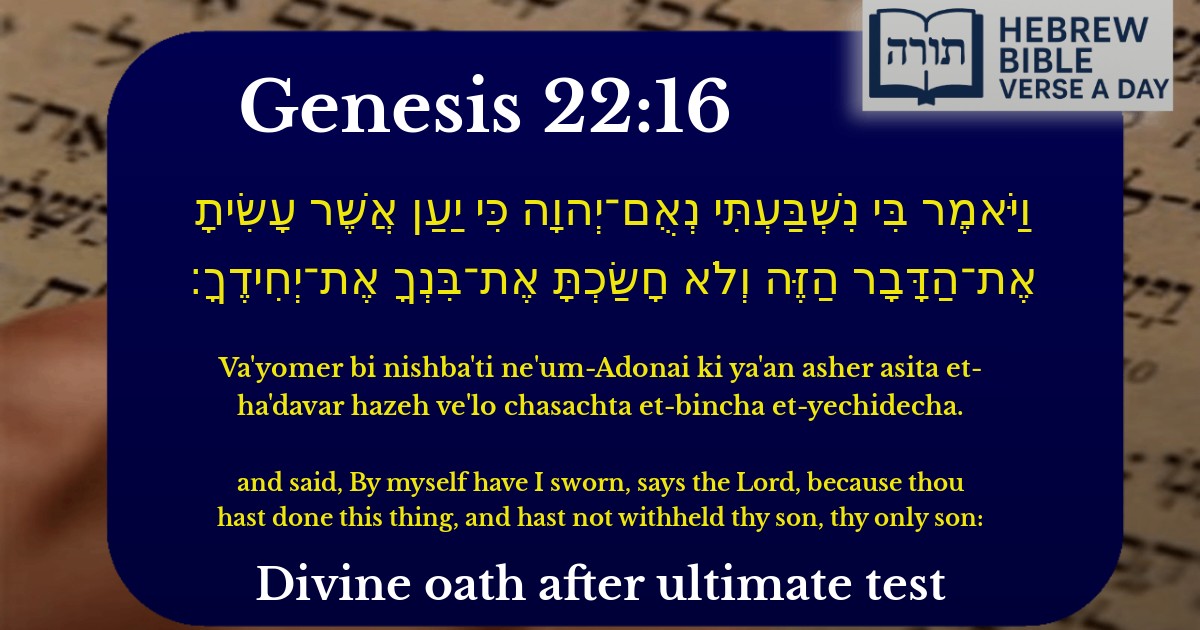Join Our Newsletter To Be Informed When New Videos Are Posted
Join the thousands of fellow Studends who rely on our videos to learn how to read the bible in Hebrew for free!
Hebrew Text
וַיֹּאמֶר בִּי נִשְׁבַּעְתִּי נְאֻם־יְהוָה כִּי יַעַן אֲשֶׁר עָשִׂיתָ אֶת־הַדָּבָר הַזֶּה וְלֹא חָשַׂכְתָּ אֶת־בִּנְךָ אֶת־יְחִידֶךָ׃
English Translation
and said, By myself have I sworn, says the Lord, because thou hast done this thing, and hast not withheld thy son, thy only son:
Transliteration
Va'yomer bi nishba'ti ne'um-Adonai ki ya'an asher asita et-ha'davar hazeh ve'lo chasachta et-bincha et-yechidecha.
Hebrew Leining Text
וַיֹּ֕אמֶר בִּ֥י נִשְׁבַּ֖עְתִּי נְאֻם־יְהֹוָ֑ה כִּ֗י יַ֚עַן אֲשֶׁ֤ר עָשִׂ֙יתָ֙ אֶת־הַדָּבָ֣ר הַזֶּ֔ה וְלֹ֥א חָשַׂ֖כְתָּ אֶת־בִּנְךָ֥ אֶת־יְחִידֶֽךָ׃
וַיֹּ֕אמֶר בִּ֥י נִשְׁבַּ֖עְתִּי נְאֻם־יְהֹוָ֑ה כִּ֗י יַ֚עַן אֲשֶׁ֤ר עָשִׂ֙יתָ֙ אֶת־הַדָּבָ֣ר הַזֶּ֔ה וְלֹ֥א חָשַׂ֖כְתָּ אֶת־בִּנְךָ֥ אֶת־יְחִידֶֽךָ׃
🎵 Listen to leining
Parasha Commentary
📚 Talmud Citations
This verse is quoted in the Talmud.
📖 Ta'anit 4a
The verse is referenced in the context of discussing the merit of Abraham's willingness to sacrifice Isaac and how it impacts future generations.
📖 Sanhedrin 89b
The verse is cited in a discussion about the binding of Isaac (Akeidah) and its significance in Jewish thought and theology.
📖 Megillah 31a
The verse is mentioned in relation to the reading of the Torah portion that includes the story of the binding of Isaac.


The Divine Oath and Its Significance
The verse (Bereishit 22:16) records Hashem's oath following Avraham Avinu's unwavering commitment during the Akeidah (Binding of Yitzchak). Rashi explains that the phrase "By myself have I sworn" signifies that Hashem swore by His own essence, as there is no higher authority by which to swear. This underscores the eternal nature of the covenant established with Avraham.
Avraham's Ultimate Test
The phrase "because thou hast done this thing" refers to Avraham's complete obedience in being willing to sacrifice his son Yitzchak. Rambam (Moreh Nevuchim 3:24) teaches that this test demonstrated Avraham's absolute love and fear of Hashem, surpassing all previous trials. The Midrash (Bereishit Rabbah 56:7) elaborates that Avraham's actions revealed his readiness to fulfill Hashem's will without hesitation.
The Meaning of "Thy Only Son"
The term "thy only son" carries deep significance. While Yitzchak was not Avraham's only biological son (Yishmael was also his son), Rashi clarifies that Yitzchak was unique in his spiritual stature as the inheritor of Avraham's legacy. The Talmud (Sanhedrin 89b) notes that Hashem emphasized Yitzchak's status to highlight the magnitude of Avraham's sacrifice.
Theological Implications